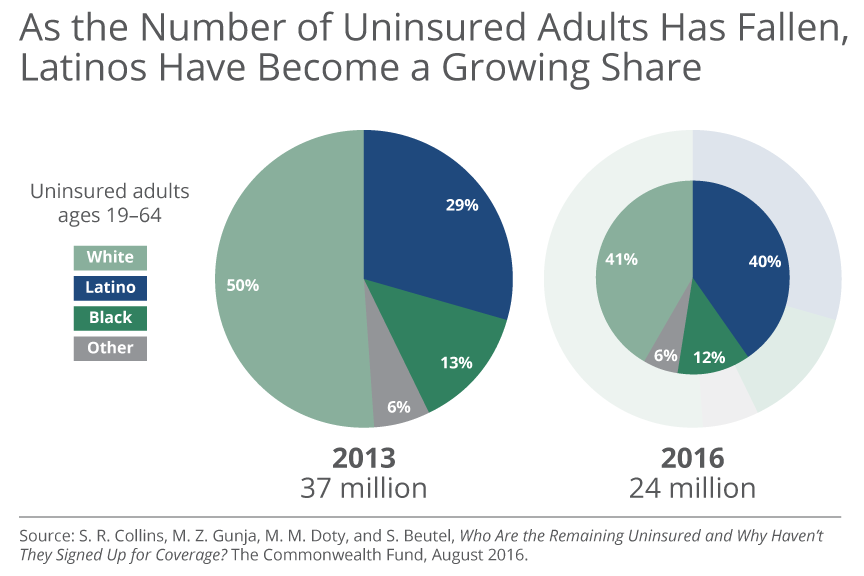New York, NY—Of the U.S. adult population currently without health insurance, 88 percent is Latino, makes less than $16, 243 a year, is under age 35, and/or works for a small business, according to new Commonwealth Fund survey findings. Half (51%) of the remaining uninsured live in one of the 20 states that had not yet expanded Medicaid at the time of the survey.
The report, Who Are the Remaining Uninsured and Why Haven’t They Signed Up for Coverage?, finds that an estimated 24 million working-age adults were uninsured between February and April 2016, six years after the initial implementation of the Affordable Care Act (ACA) in 2010. According to the report, as the number of people without health insurance declined by 20 million since the law went into effect, the composition of the uninsured population has changed: white adults now represent a smaller share and Latinos a larger share. 
“About 26 million Americans have gained coverage through the Affordable Care Act’s marketplaces and Medicaid expansion,” said Sara Collins, Vice President for Health Care Coverage and Access at The Commonwealth Fund and the report’s lead author. “However, millions of people still don’t have health insurance. That means they are likely to go without the health care they need and are at risk of medical debt or bankruptcy if they get sick.”
The study finds that state and federal policies, varying levels of awareness about the health insurance marketplaces, and concerns about affordability are the primary reasons people remained uninsured. Specifically:
- The ACA excludes undocumented immigrants. While exact data are not available, the authors say undocumented status is likely a major reason why many Latinos remain uninsured. Latinos also make up a significant portion of other groups at high risk for not having coverage: Among uninsured adults earning less than 138 percent of the federal poverty level ($16,243 for an individual or $33,465 for a family of four), 47 percent are Latino. Latinos also comprise 47 percent of uninsured young adults, and 46 percent of uninsured adults working for small businesses. An analysis published simultaneously on The Commonwealth Fund’s To the Point blog uses the survey to delve further into the effects of the ACA on Latinos’ health insurance.
- Twenty states—including Texas and Florida, two of the largest states in the country—had not expanded their Medicaid programs at the time of the survey. One-third of all adults who remain uninsured have incomes that would likely qualify them for Medicaid (under 138 percent of poverty) but live in one of the 20 states without expanded Medicaid (Louisiana expanded eligibility this year and began enrollment in June). This especially affects uninsured young adults, of whom 38 percent, or an estimated 4 million, have incomes that would qualify them for Medicaid but live in nonexpansion states.
- Uninsured adults are concerned they cannot afford marketplace coverage even if their income might qualify them for plan subsidies or for Medicaid. In the survey, 64 percent of uninsured adults who knew about the marketplaces but had not shopped for coverage said it was because they assumed they would not be able to afford it. Of those that did look for marketplace coverage but did not buy it or find any other insurance, 85 percent said they could not find an affordable plan. A large majority (86%) of this group, who were also uninsured, had incomes qualifying them for subsidies or Medicaid, though some may not have been eligible because of their immigration status.
- The uninsured are less aware of the marketplaces. About 62 percent of uninsured survey respondents were aware of the marketplaces, compared to 79 percent of all adults.
Covering the Remaining Uninsured
The ACA has expanded health insurance and access to health care for millions of Americans. Ensuring that everyone in the United States receives the full benefits of the law, the report’s authors say, may require additional action:
- States could expand eligibility for their Medicaid programs, which would immediately extend health insurance to millions of uninsured people.
- Enhanced subsidies and lower cost-sharing in marketplace plans may be needed to encourage some of the remaining uninsured to enroll, especially those with moderate incomes.
- Broad immigration reform would help increase the numbers of people who are eligible for coverage under the ACA. A loosening of the law’s restrictions on eligibility for undocumented immigrants would also help.
- More efforts to reach the uninsured and help them with the enrollment process would increase coverage.
“The Affordable Care Act was designed to help the United States achieve coverage for all Americans and ensure that everyone can get the health care they need,” said Commonwealth Fund President David Blumenthal, M.D. “The law has been successful in reducing the number of uninsured, but now it is time to make it possible for all to realize its benefits.”
| Methodology |
|
The Commonwealth Fund Affordable Care Act Tracking Survey, February-April 2016, was conducted by SSRS from February 2-April 5, 2016. The survey consisted of 15-minute telephone interviews in English or Spanish and was conducted among a random, nationally representative sample of 4,802 adults, ages 19 to 64, living in the United States. Overall, 1,496 interviews were conducted on landline telephones and 3,306 interviews on cellular phones. This survey is the fourth in a series of Commonwealth Fund surveys to track the implementation and impact of the Affordable Care Act. Like the prior waves of the survey, the February-April 2016 sample was designed to increase the likelihood of surveying respondents who had gained coverage under the ACA. Interviews in Wave 4 were obtained through two sources: (1) stratified RDD sample; and (2) households reached through the SSRS Omnibus where interviews were previously completed with respondents ages 19 to 64 who were uninsured, had individual coverage, had a marketplace plan, or had public insurance. As in all waves of the survey, SSRS oversampled adults with incomes under 250 percent of poverty. The data are weighted to correct for the stratified sample design, the use of recontacted respondents from the omnibus survey, the overlapping landline and cellular phone sample frames, and disproportionate nonresponse that might bias results. The resulting weighted sample is representative of the approximately 189 million U.S. adults ages 19 to 64. The survey has an overall margin of sampling error of +/– 2.0 percentage points at the 95 percent confidence level.
|


